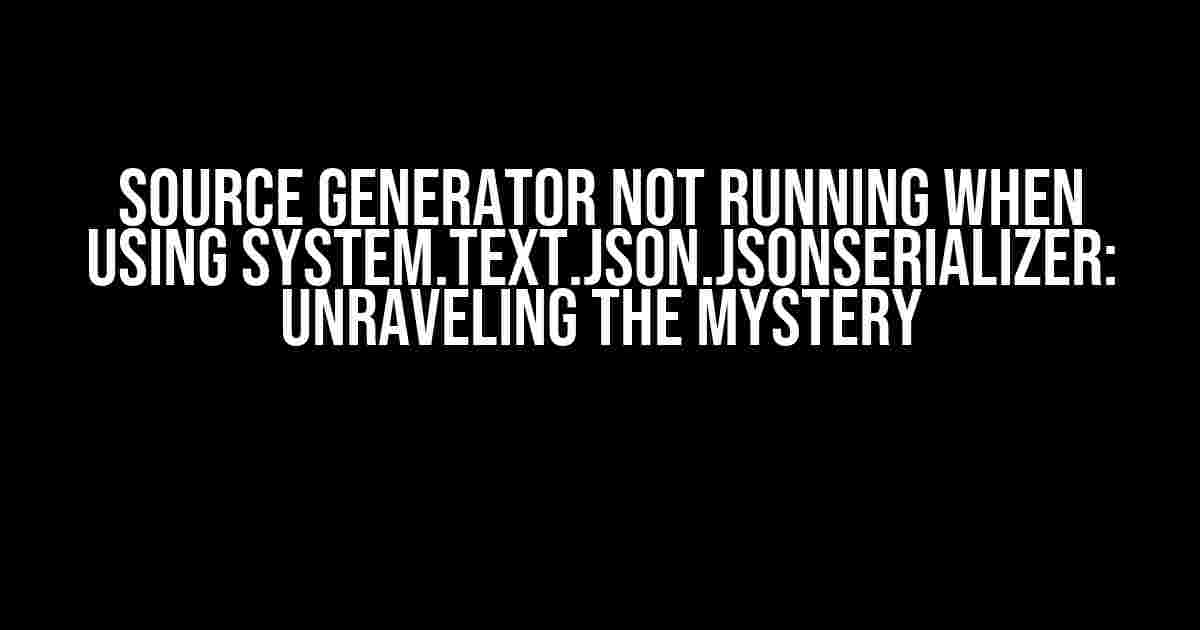Are you stuck with the perplexing issue of Source Generators not running when leveraging the mighty System.Text.Json.JsonSerializer in your .NET application? Fear not, dear developer, for we’re about to embark on a thrilling adventure to conquer this enigmatic problem together!
The Scene of the Crime: Understanding Source Generators
In the world of .NET, Source Generators are a powerful tool that allows developers to generate code at compile-time. This magic happens through the analyzers, which inspect your code, identify areas for improvement, and generate new code to enhance performance, readability, or maintainability. It’s like having a superpower at your fingertips!
<csharp>
public static void Generate(
[NotNull] IncrementalGeneratorInitializationContext context)
{
// Your generator code goes here
}
</csharp>
The Suspect: System.Text.Json.JsonSerializer
Now, let’s shift our attention to the System.Text.Json.JsonSerializer, a high-performance JSON serializer that’s part of the .NET ecosystem. This serializer is designed to provide a fast and efficient way to serialize and deserialize JSON data. But, as we’ll discover, it can sometimes interfere with our beloved Source Generators.
<csharp> var jsonSerializer = JsonSerializer.Serialize(myObject); </csharp>
The Problem: Source Generator Not Running
So, what happens when we try to use System.Text.Json.JsonSerializer in conjunction with Source Generators? You guessed it – the Source Generator simply refuses to run! It’s as if the serializer is casting a spell of invisibility on our generator code.
Why is this Happening?
To comprehend this enigmatic behavior, we need to dive deeper into the internals of the .NET compiler platform. When you use System.Text.Json.JsonSerializer, it employs a technique called “runtime metadata” to access the compiled assembly’s metadata. This metadata is used to serialize and deserialize JSON data.
The catch? The runtime metadata mechanism bypasses the compilation pipeline, which is where our Source Generators reside. As a result, the generator code is never executed, leaving us perplexed and frustrated.
The Solution: Working Around the Limitation
Fear not, dear developer! We have a few clever workarounds to get our Source Generators up and running again:
-
Use a Different Serializer
One approach is to switch to a different serializer that doesn’t rely on runtime metadata, such as the popular Newtonsoft.Json library. This might require some adjustments to your code, but it’s a viable solution.
<csharp> using Newtonsoft.Json; var jsonSerializer = JsonConvert.SerializeObject(myObject); </csharp>
-
Separate Compilation
Another technique involves separating the compilation of your generator code from the serialization logic. This can be achieved by creating a separate assembly for the generator code and referencing it in your main project.
<csharp> // In GeneratorAssembly.csproj public static void Generate( [NotNull] IncrementalGeneratorInitializationContext context) { // Your generator code goes here } </csharp> // In MainProject.csproj <csharp> using GeneratorAssembly; // Use the generated code </csharp> -
Custom Serialization
If you’re not tied to a specific serializer, you can create a custom serialization mechanism that doesn’t rely on runtime metadata. This might require more effort, but it grants you complete control over the serialization process.
<csharp> public class CustomSerializer { public string Serialize(object obj) { // Custom serialization logic goes here } } </csharp>
Conclusion: The Mystery Unraveled
And there you have it, dear developer! We’ve demystified the enigmatic issue of Source Generators not running when using System.Text.Json.JsonSerializer. By understanding the underlying mechanisms and employing clever workarounds, you can overcome this limitation and unlock the full potential of Source Generators in your .NET applications.
| Takeaway | Description |
|---|---|
| Source Generators | Powerful tool for generating code at compile-time |
| System.Text.Json.JsonSerializer | High-performance JSON serializer that bypasses the compilation pipeline |
| Workarounds | Use a different serializer, separate compilation, or custom serialization |
Remember, in the world of .NET development, understanding the intricacies of the compiler platform and its eco-system is key to unlocking the secrets of the universe (or at least, to solving pesky issues like this one)!
- Microsoft Docs: Source Generators Overview
- Microsoft Docs: JsonSerializer Class
- GitHub Issue: Source Generator not running when using JsonSerializer
Happy coding, and may the source be with you!
Frequently Asked Question
Get the scoop on why your Source Generator isn’t running when using System.Text.Json.JsonSerializer!
Why does my Source Generator stop working when I use System.Text.Json.JsonSerializer?
When you use System.Text.Json.JsonSerializer, it’s possible that the JSON serialization process is interfering with the Source Generator. This might be due to the generator relying on specific types or interfaces that are not being serialized correctly. Try debugging your serialization process or using an alternative serialization method to see if that resolves the issue.
Is there a specific version of System.Text.Json that’s causing the issue?
While it’s not specific to a particular version, it’s possible that updates to System.Text.Json might have introduced changes that affect Source Generator compatibility. Make sure you’re using the latest version of System.Text.Json and check the release notes for any known issues related to Source Generators.
Can I use a different JSON serializer to avoid this issue?
Yes, you can try using alternative JSON serializers like Newtonsoft.Json or Json.NET. These serializers might not interfere with your Source Generator, and you can continue to use the generator without issues. However, be aware that switching serializers might require changes to your code and dependencies.
How do I troubleshoot the Source Generator issue?
To troubleshoot the issue, try enabling debug logging for the Source Generator and check the output for any errors or warnings. You can also use tools like the .NET debugger or a decompiler to inspect the generated code and identify potential issues. Additionally, try isolating the problem by creating a minimal reproducible example to see if the issue persists.
Are there any workarounds or patches available for this issue?
While there might not be an official patch or workaround, you can try searching for community-provided solutions or patches on platforms like GitHub or Stack Overflow. Additionally, you can reach out to the System.Text.Json or Source Generator maintainers to report the issue and request assistance. Who knows, you might even get a fix or guidance to resolve the problem!
